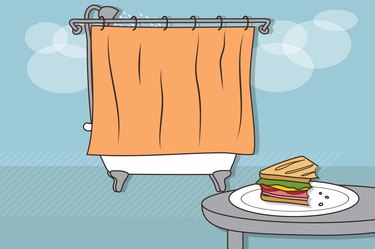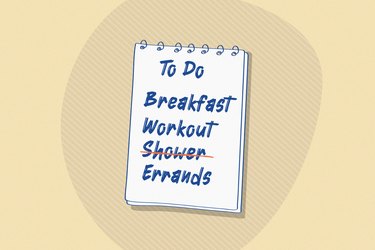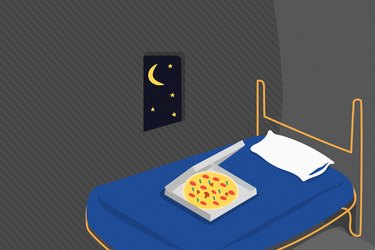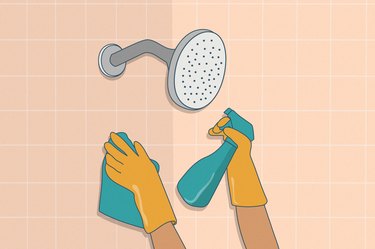
Dinner, shower and sleep may seem like the ideal nighttime routine, but it may not be the best for your digestive system.
Indeed, a hot shower after eating could lead to issues like cramping or indigestion. Why? It all has to do with the temperature of the water and how that affects blood flow in your body.
Video of the Day
Here's more on why it can be bad to take a shower after eating, plus bathing tips to optimize your digestion.
The Negative Effects of Showering After Eating
"When you consume a meal, your body temperature slightly rises as blood moves towards your digestive organs," says Peyton Berookim, MD, a double board-certified gastroenterologist at the Gastroenterology Institute of Southern California. "This helps your body digest food properly, giving you comfort and ease."
But if you take a warm bath or shower immediately after a meal, the hot water further raises your body's temperature and diverts blood away from your digestive organs, Dr. Berookim adds.
Instead, that oh-so-important blood goes toward your skin, says Elena Ivanina, DO, MPH, quadruple board-certified gastroenterologist.
"Taking a warm shower after eating would theoretically reroute the blood away from the stomach, therefore compromising the digestive process and possibly causing symptoms such as cramping when the stomach does not receive the blood flow that it needs," she adds.
If you just finished a heavy meal, this may also lead to indigestion, Dr. Berookim says.
Tip
Sticking to smaller portions and remaining upright after eating are two natural remedies to prevent indigestion.
How and When Should You Shower Instead?
Hot water can mess with your digestion. But is it bad to take a cold shower after eating? Here's what the experts have to say.
"Cold showers would, on the contrary, lower your body temperature and not divert blood away from digestive organs," Dr. Berookim says. "Cold showers may actually jumpstart your metabolism, and may even help you burn more fat from the meal you just ate."
However, Dr. Ivanina advises taking a room-temperature shower if you must bathe after eating.
"A cold shower shocks the system and narrows the veins going to the skin, while a hot shower opens the veins going to the skin," she says. "A neutral temperature would have less effect on rerouting blood flow."
That said, Dr. Berookim says that ideally, it would be best to allow your body to undergo the beginning steps of digestion before taking a shower, regardless of the temperature — he recommends waiting at least 20 to 30 minutes before bathing.
Dr. Ivanina is more conservative. "Ideally, you just shower before eating," she says. "But if you need to shower after [eating], then waiting about an hour should be enough for the stomach to get all the extra blood flow it needs for digestion."
Swimming After Eating
While not a shower per se, swimming after eating also isn't advised. Entering any warm body of water, like a pool, would have the same effect on your body as taking a hot bath or shower, Dr. Berookim says.
“In addition, swimming is a physical exercise that would get your heart rate up and require blood flow to your muscles, pooling it away from the digestive organs,” he says.
That's why it's typically best to avoid any exercise after eating, which can likewise redirect blood flow away from your GI system.
So, How Bad Is It Really to Shower After Eating?
Taking a warm or hot shower right after a meal ups the chances you'll experience abdominal cramping or indigestion.
Instead, it's best to wait between 20 minutes and an hour before bathing in order to give your digestive system some time to do its thing.
If you absolutely must shower after a meal, though, stick to neutral temperatures that won't redirect blood flow away from your GI organs.
Dr. Ivanina's advice? "An ideal start to the day would be to have a glass of room temperature water, exercise, shower and then have a nutritious breakfast."
If you normally shower at night, the same policy goes for dinner time — plan to shower before you chow down (or a while after) to avoid an upset stomach.
Was this article helpful?
150 Characters Max
0/150
Thank you for sharing!
Thank you for your feedback!
Is this an emergency? If you are experiencing serious medical symptoms, please see the National Library of Medicine’s list of signs you need emergency medical attention or call 911.



